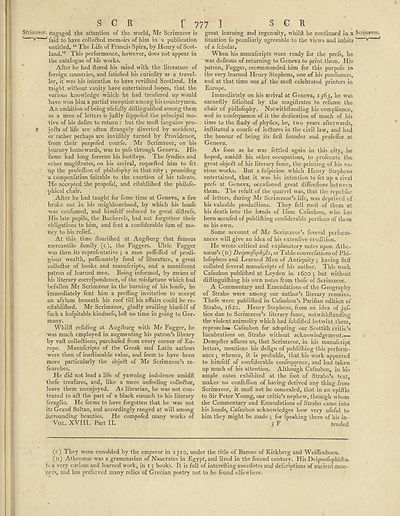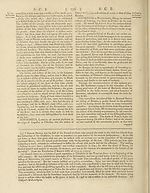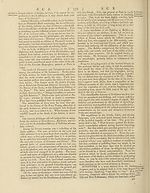Encyclopaedia Britannica, or, a Dictionary of arts, sciences, and miscellaneous literature : enlarged and improved. Illustrated with nearly six hundred engravings > Volume 18, RHI-SCR
(815) Page 777
Download files
Complete book:
Individual page:
Thumbnail gallery: Grid view | List view

SCR f 777 ] SCR
Sc'ritnzeor. engaged the attention of the world, Mr Scrimzeor is
fajj have colleiled memoirs of him in a publication
entitled, “ The Life of Francis Spira, by Henry of Scot¬
land.” This performance, however, does not appear in
the catalogue of his works.
After he had ftored his mind with the literature of
foreign countries, and fatisfied his curiofity as a travel¬
ler, it was his intention to have revifited Scotland. He
might without vanity have entertained hopes, that the
various knowledge which he had treafured up would
have won him a partial reception among his countrymen.
An ambition of being ufefully ditlinguiihed among them
as a man of letters is juftly fuppofed the principal mo¬
tive of his defire to return : but the moft fanguine pro-
f je£ts of life are often ftrangely diverted by accident,
or rather perhaps are invifibly turned by Providence,
from their purpofed courfe. Mr Scrimzeor, on his
iourney homewards, was to pafs through Geneva. His
fame had long forerun his footfteps. The fyndics and
other magiftrates, on his arrival, requefted him to let
wp the profefiion of philofophy in that city 5 promifing
a compenfation fuitable to the exertion of his talents.
He accepted the propofal, and eftablilhed the philofo-
phical chair.
After he had taught for fome time at Geneva, a fire
broke out in his neighbourhood, by which his houfe
was confumed, and himfelf reduced to great diftrefs.
His late pupils, the Bucherels, had not forgotten their
obligations to him, and fent a confiderable fum of mo¬
ney to his relief.,
At this time flouriftied at Auglburg that famous
mercantile family (c), the Fuggers. Ulric Fugger
was then its reprefentative j a man poffefled of prodi¬
gious wealth, paflionately fond of literattlre, a great
colle&or of books and manufcripts, and a munificent
patron of learned men. Being informed, by means of
his literary correfpondence, of the misfprtune which had
befallen Mr Scrimzeor in the burning of his houfe, he
immediately fent him a preffing invitation to accept
an afylum beneath his roof till his affairs could be re-
eftablilhed. Mr Scrimzeor, gladly availing himfelf of
fuch a hofpitable kindnefs, loft no time in going to Ger¬
many.
Whilft refiding at Augfburg with Mr Fugger, he
was much employed in augmenting his patron’s library
by vaft colleftions, purchafed from every corner of Eu¬
rope. Manufcripts of the Greek and Latin authors
were then of ineftimable value, and feem to have been
more particularly the objedt of Mr Scrimzeor’s re-
fe arches.
He did not lead a life of yawning indolence amidft
thefe treafures, and, like a mere unfeeling colledlor,
leave them unenjoyed. As librarian, he was not con¬
tented to aft the part of a black eunuch to his literary
feraglio. He feems to have forgotten that he was not
its Grand Sultan, and accordingly ranged at will among
jurrounding beauties. He compofed many works of
( Vol. XVIII. Part II.
great learning and ingenuity, whilft he continued in a Scrimeeor.
fituation fo peculiarly agreeable to the views and habits v
of a fcholar.
When his manufcripts were ready for the prefs, he
was defirous of returning to Geneva to print them. His
patron, Fugger, recommended him for this purpofe to
the very learned Henry Stephens, one of his penfioners,
and at that time one pf the moft celebrated printers in
Europe.
Immediately on his arrival at Geneva, 1563, he was
earneftly folicited by the magiftrates to refume the
chair of philofophy. Notwithftanding his compliance,
and in confequence of it the dedication of much of his
time to the ftudy of phyfics, he, two years afterwards,
inftituted a courfe of leftures in the civil law, and had
the honour of being its firft founder and profeffor at
Geneva.
As foon as he was fettled again in this city, he
hoped, amidft his other occupations, to profecute the
great objeft of his literary fame, the printing of his va¬
rious works. But a fufpicion which Henry Stephens
entertained, that it was his intention to fet up a rival
prefs at Geneva, occafioned great diflenfions between
them. The refult of the quarrel was, that the republic
of letters, during Mr Scrimzeor’s life, was deprived of
his valuable produftions. They fell mort of them at
his death into the hands of Ifaac Cafaubon, who has
been accufed of publiftiing confiderable portions of them
as his own.
Some account of Mr Scrimzeor’s feveral perform¬
ances will give an idea of his extenfive erudition.
He wrote critical and explanatory notes upon Athe-
naeus’s (d) Deipnofophijls, or Table converfations of Phi-
lofophers and Learned Men of Antiquity3 having firft
collated feveral manufcripts of his author. This work
Cafaubon publiftied at Leyden in 16005 but without
diftinguiftiing his own notes from thofe of Scrimzeor.
A Commentary and Emendations of the Geography
of Strabo were among our author’s literary remains.
Thefe were publifhed in Cafaubon’s Parifian edition of
Strabo, 1620. Henry Stephens, from an idea of juf-
tice due to Scrimzeor’s literary fame, notwithftanding
the violent animofity which had fubfifted betwixt them,
reproachas Cafaubon for adopting our Scottifti critic’s
lucubrations on Strabo without acknowledgement.—-
Dempfter allures us, that Scrimzeor, in his manufcript
letters, mentions his defign of publilhing this perform¬
ance 5 whence, it is probable, that his work appeared
to himfelf of confiderable confequence, and had taken
up much of his attention. Although Cafaubon, in his
ample notes exhibited at the foot of Strabo’s text,
makes no confeflion of having derived any thing from
Scrimzeor, it muft not be concealed, that in an epiftle
to Sir Peter Young, our critic’s nephew, through whom
the Commentary and Emendations of Strabo came into
his hands, Cafaubon acknowledges how very ufeful to
him they might be made 5 for ipeaking there of his in-
5 F tended
(c) They were ennobled by the emperor in 1510, under the title of Barons of Kirkberg and Weiflenborn.
(n) Athenaeus was a grammarian of Naucrates in Egypt, and lived in the fecond century. His Deipnofophiftas.
is a very curious and learned work, in 15 books. It is full of interefting anecdotes and defcriptions of anpient man'-
nets, and has preferved many relics of Grecian poetry not to be found elfewhere.
Sc'ritnzeor. engaged the attention of the world, Mr Scrimzeor is
fajj have colleiled memoirs of him in a publication
entitled, “ The Life of Francis Spira, by Henry of Scot¬
land.” This performance, however, does not appear in
the catalogue of his works.
After he had ftored his mind with the literature of
foreign countries, and fatisfied his curiofity as a travel¬
ler, it was his intention to have revifited Scotland. He
might without vanity have entertained hopes, that the
various knowledge which he had treafured up would
have won him a partial reception among his countrymen.
An ambition of being ufefully ditlinguiihed among them
as a man of letters is juftly fuppofed the principal mo¬
tive of his defire to return : but the moft fanguine pro-
f je£ts of life are often ftrangely diverted by accident,
or rather perhaps are invifibly turned by Providence,
from their purpofed courfe. Mr Scrimzeor, on his
iourney homewards, was to pafs through Geneva. His
fame had long forerun his footfteps. The fyndics and
other magiftrates, on his arrival, requefted him to let
wp the profefiion of philofophy in that city 5 promifing
a compenfation fuitable to the exertion of his talents.
He accepted the propofal, and eftablilhed the philofo-
phical chair.
After he had taught for fome time at Geneva, a fire
broke out in his neighbourhood, by which his houfe
was confumed, and himfelf reduced to great diftrefs.
His late pupils, the Bucherels, had not forgotten their
obligations to him, and fent a confiderable fum of mo¬
ney to his relief.,
At this time flouriftied at Auglburg that famous
mercantile family (c), the Fuggers. Ulric Fugger
was then its reprefentative j a man poffefled of prodi¬
gious wealth, paflionately fond of literattlre, a great
colle&or of books and manufcripts, and a munificent
patron of learned men. Being informed, by means of
his literary correfpondence, of the misfprtune which had
befallen Mr Scrimzeor in the burning of his houfe, he
immediately fent him a preffing invitation to accept
an afylum beneath his roof till his affairs could be re-
eftablilhed. Mr Scrimzeor, gladly availing himfelf of
fuch a hofpitable kindnefs, loft no time in going to Ger¬
many.
Whilft refiding at Augfburg with Mr Fugger, he
was much employed in augmenting his patron’s library
by vaft colleftions, purchafed from every corner of Eu¬
rope. Manufcripts of the Greek and Latin authors
were then of ineftimable value, and feem to have been
more particularly the objedt of Mr Scrimzeor’s re-
fe arches.
He did not lead a life of yawning indolence amidft
thefe treafures, and, like a mere unfeeling colledlor,
leave them unenjoyed. As librarian, he was not con¬
tented to aft the part of a black eunuch to his literary
feraglio. He feems to have forgotten that he was not
its Grand Sultan, and accordingly ranged at will among
jurrounding beauties. He compofed many works of
( Vol. XVIII. Part II.
great learning and ingenuity, whilft he continued in a Scrimeeor.
fituation fo peculiarly agreeable to the views and habits v
of a fcholar.
When his manufcripts were ready for the prefs, he
was defirous of returning to Geneva to print them. His
patron, Fugger, recommended him for this purpofe to
the very learned Henry Stephens, one of his penfioners,
and at that time one pf the moft celebrated printers in
Europe.
Immediately on his arrival at Geneva, 1563, he was
earneftly folicited by the magiftrates to refume the
chair of philofophy. Notwithftanding his compliance,
and in confequence of it the dedication of much of his
time to the ftudy of phyfics, he, two years afterwards,
inftituted a courfe of leftures in the civil law, and had
the honour of being its firft founder and profeffor at
Geneva.
As foon as he was fettled again in this city, he
hoped, amidft his other occupations, to profecute the
great objeft of his literary fame, the printing of his va¬
rious works. But a fufpicion which Henry Stephens
entertained, that it was his intention to fet up a rival
prefs at Geneva, occafioned great diflenfions between
them. The refult of the quarrel was, that the republic
of letters, during Mr Scrimzeor’s life, was deprived of
his valuable produftions. They fell mort of them at
his death into the hands of Ifaac Cafaubon, who has
been accufed of publiftiing confiderable portions of them
as his own.
Some account of Mr Scrimzeor’s feveral perform¬
ances will give an idea of his extenfive erudition.
He wrote critical and explanatory notes upon Athe-
naeus’s (d) Deipnofophijls, or Table converfations of Phi-
lofophers and Learned Men of Antiquity3 having firft
collated feveral manufcripts of his author. This work
Cafaubon publiftied at Leyden in 16005 but without
diftinguiftiing his own notes from thofe of Scrimzeor.
A Commentary and Emendations of the Geography
of Strabo were among our author’s literary remains.
Thefe were publifhed in Cafaubon’s Parifian edition of
Strabo, 1620. Henry Stephens, from an idea of juf-
tice due to Scrimzeor’s literary fame, notwithftanding
the violent animofity which had fubfifted betwixt them,
reproachas Cafaubon for adopting our Scottifti critic’s
lucubrations on Strabo without acknowledgement.—-
Dempfter allures us, that Scrimzeor, in his manufcript
letters, mentions his defign of publilhing this perform¬
ance 5 whence, it is probable, that his work appeared
to himfelf of confiderable confequence, and had taken
up much of his attention. Although Cafaubon, in his
ample notes exhibited at the foot of Strabo’s text,
makes no confeflion of having derived any thing from
Scrimzeor, it muft not be concealed, that in an epiftle
to Sir Peter Young, our critic’s nephew, through whom
the Commentary and Emendations of Strabo came into
his hands, Cafaubon acknowledges how very ufeful to
him they might be made 5 for ipeaking there of his in-
5 F tended
(c) They were ennobled by the emperor in 1510, under the title of Barons of Kirkberg and Weiflenborn.
(n) Athenaeus was a grammarian of Naucrates in Egypt, and lived in the fecond century. His Deipnofophiftas.
is a very curious and learned work, in 15 books. It is full of interefting anecdotes and defcriptions of anpient man'-
nets, and has preferved many relics of Grecian poetry not to be found elfewhere.
Set display mode to:
![]() Universal Viewer |
Universal Viewer | ![]() Mirador |
Large image | Transcription
Mirador |
Large image | Transcription
Images and transcriptions on this page, including medium image downloads, may be used under the Creative Commons Attribution 4.0 International Licence unless otherwise stated. ![]()
| Permanent URL | https://digital.nls.uk/193029302 |
|---|
| Attribution and copyright: |
|
|---|
| Description | Ten editions of 'Encyclopaedia Britannica', issued from 1768-1903, in 231 volumes. Originally issued in 100 weekly parts (3 volumes) between 1768 and 1771 by publishers: Colin Macfarquhar and Andrew Bell (Edinburgh); editor: William Smellie: engraver: Andrew Bell. Expanded editions in the 19th century featured more volumes and contributions from leading experts in their fields. Managed and published in Edinburgh up to the 9th edition (25 volumes, from 1875-1889); the 10th edition (1902-1903) re-issued the 9th edition, with 11 supplementary volumes. |
|---|---|
| Additional NLS resources: |
|

